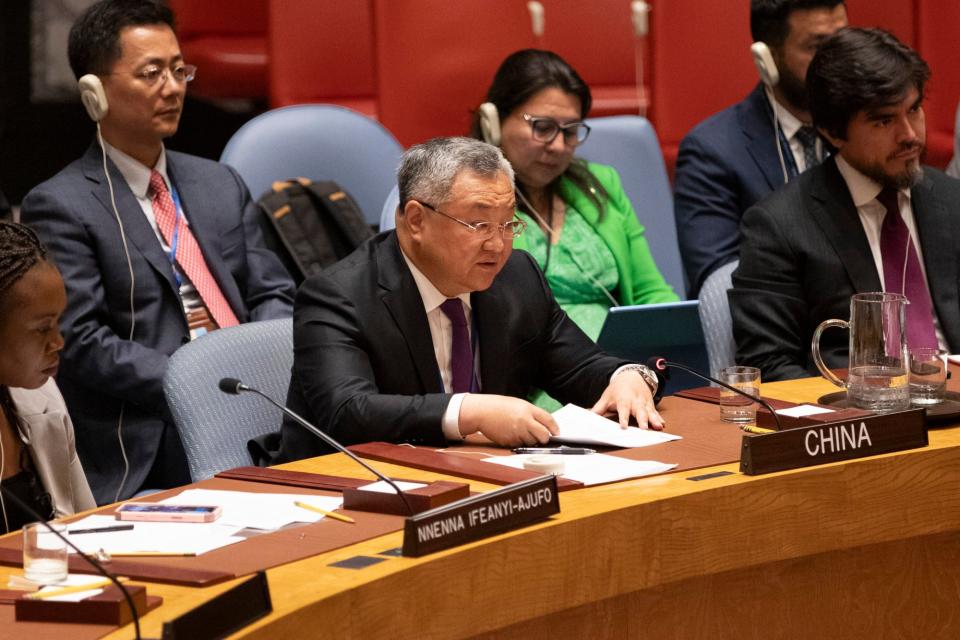China-led resolution on artificial intelligence passes in United Nations General Assembly
In a diplomatic win for Beijing on Monday, the United Nations General Assembly unanimously adopted a China-led resolution that urges the international community to create a "free, open, inclusive and non-discriminatory" business environment among wealthy and developing nations for artificial intelligence development.
More than 140 nations, including the United States, co-sponsored the non-binding resolution affirming that all nations should "enjoy equal opportunities" in the non-military domain, calling for global cooperation to assist developing countries facing "unique challenges" and ensure "they will not be further left behind".
Fu Cong, China's permanent representative to the United Nations, said after the assembly session that a "fragmented approach toward AI, toward the digital technology, is not going to benefit anybody".
Do you have questions about the biggest topics and trends from around the world? Get the answers with SCMP Knowledge, our new platform of curated content with explainers, FAQs, analyses and infographics brought to you by our award-winning team.
He added that the resolution was proposed to "emphasize the important role that the UN could play" on AI governance as the "most inclusive organization".
Describing the significance of the measure as "great and far-reaching", the envoy noted that AI technology was advancing quickly and the "gap between the North and South, especially between the developing countries and the developed countries, is also widening".
Ambassador Fu, who served as the director-general of the department of arms control at the Chinese foreign affairs ministry from 2018 to 2022, also said that China was "very thankful, and we're very appreciative of the positive role that the US has played in this whole process".
He added that the issue of AI had been discussed at "a very senior level, at the foreign-ministers level, and also even at the head-of-state level".

Fu Cong, China's permanent representative to the United Nations, said Beijing had conferred with Washington at "a very senior level" concerning the resolution. Photo: Xinhua alt=Fu Cong, China's permanent representative to the United Nations, said Beijing had conferred with Washington at "a very senior level" concerning the resolution. Photo: Xinhua>
"So we do look forward to intensifying our cooperation with the United States, and, for that matter, with all countries in the world on this issue," he said.
Beijing's initiative also follows the assembly's adoption of the first global resolution on AI in March. Proposed by Washington and co-sponsored by China and over 120 nations, the measure encouraged countries to safeguard human rights, protect personal data and monitor AI for potential risks.
A senior official from US President Joe Biden's administration later said that consensus had been achieved after "intense discussions" among countries with differing views.
On Monday, Ambassador Fu called the two resolutions "complementary", saying the earlier one was "more general" and the Chinese one was "more focused on the capacity building".
Beijing has sought to incorporate voices from the developing world into discussions on managing AI. In October, China released its Global AI Governance Initiative, saying that "all countries, regardless of their size, strength, or social system, should have equal rights to develop and use AI".
And during the inaugural AI safety dialogue between Beijing and Washington in Geneva in May, China advocated for "enhancing global governance of artificial intelligence" and proposed expanding the UN role.
Beijing is seen as trying to ensure that the US solely does not dominate the discourse on setting global standards for AI.
The US and China also remain locked in a competition to advance in the hi-tech fields of AI and semiconductors.
In March, Washington revised regulations further limiting China's access to US-made AI chips and chip-making tools. The export controls were initially introduced in October 2022 to prevent Beijing from leveraging American technology for military modernization. They were updated a year later to eliminate loopholes.
In another push to hobble Beijing's ability to gain cutting-edge technologies like semiconductors, quantum computing and AI, Biden signed an executive order in August 2023 banning US individuals and companies from investing in "sensitive" sectors in China.
The US Treasury Department, which is defining the restrictions in the measure, said last week that they would focus on "the next generation of military, intelligence, surveillance or cyber-enabled capabilities that pose national security risks to the United States".
On Monday, Ambassador Fu called on the US to lift the sanctions in line with the newly adopted resolution.
"If people are true to the content of this resolution, it says that it is important to foster inclusive business environment. We don't think that the US actions ... [are] along that line," he said.
This article originally appeared in the South China Morning Post (SCMP), the most authoritative voice reporting on China and Asia for more than a century. For more SCMP stories, please explore the SCMP app or visit the SCMP's Facebook and Twitter pages. Copyright © 2024 South China Morning Post Publishers Ltd. All rights reserved.
Copyright (c) 2024. South China Morning Post Publishers Ltd. All rights reserved.

 Yahoo Finance
Yahoo Finance 